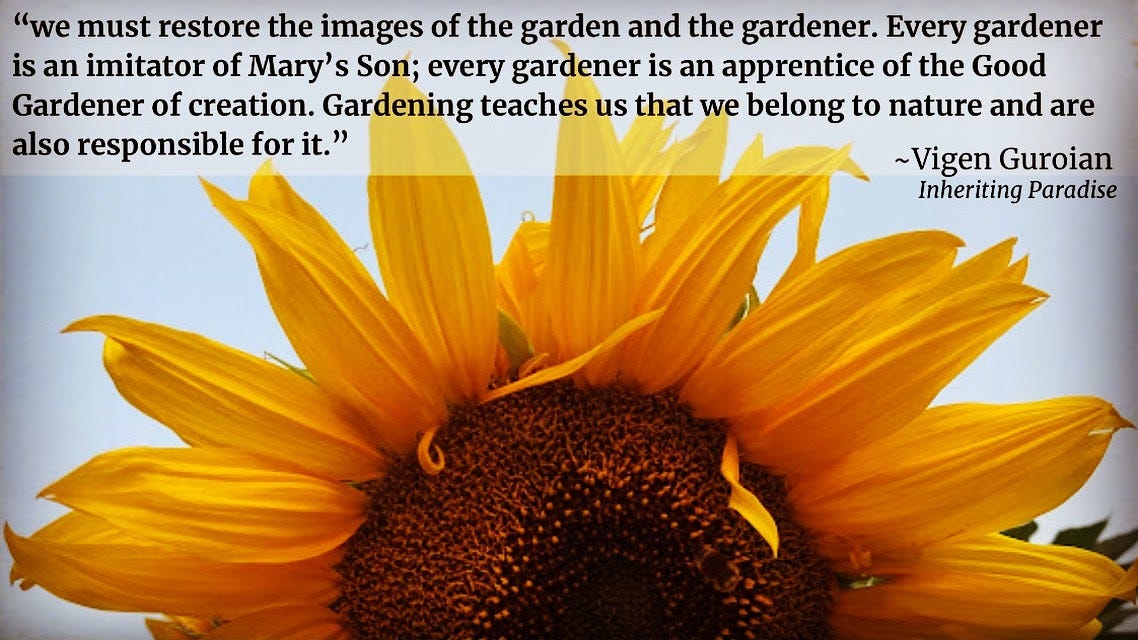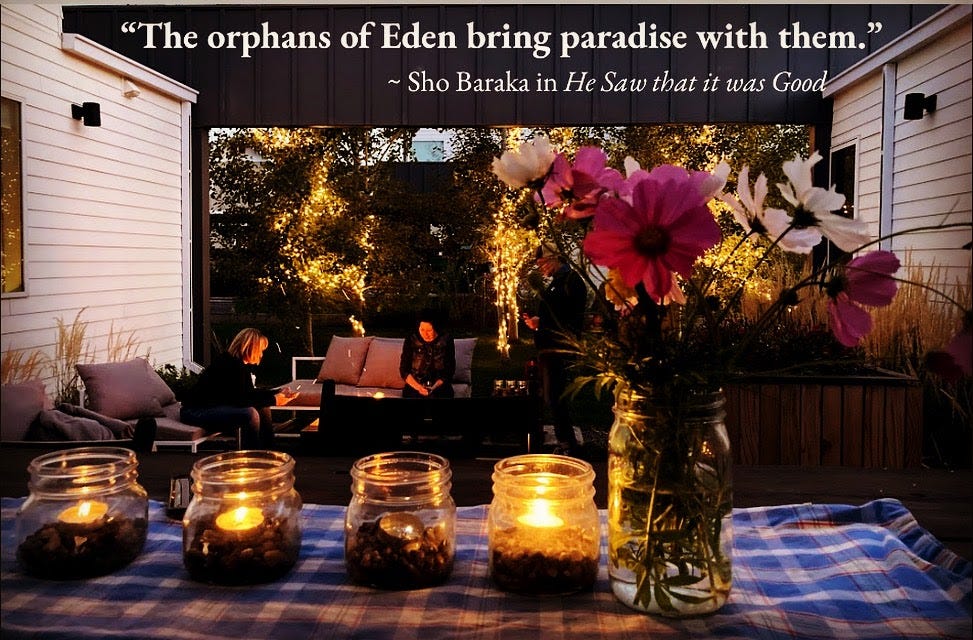I love gardening.
I love how the garden takes shape as I think and plan.
I love how my patience is developed and rewarded as I wait for the tiny green sprouts to peek through the dark dirt.
I love tending the plants, watching them grow, and delighting in their progress.
I love harvesting flowers and vegetables and fruit.
I love sharing meals with my family and friends from what has grown in the garden.
I love preserving the garden produce in my freezer and canning jars for future feasts.
More than all of these, though, I think I love gardening because the garden becomes a place where I, myself, am grown. As I tend my garden, God tends me.
The garden reminds me that, like the ground from which I came, I am God’s creation. In some way, I belong to the earth, and it belongs to me, and together we belong to the One who made us both. I am reminded of St. Francis of Assisi’s Canticle of the Sun, and thankful for his imaginative vision for what it is to be part of creation.
THE CANTICLE OF THE SUN
Most high, all powerful, all good Lord! All praise is Yours, all glory, all honor, and all blessing. To You, alone, Most High, do they belong. No mortal lips are worthy to pronounce Your name.
Be praised, my Lord, through all Your creatures, especially through my lord Brother Sun,
who brings the day; and You give light through him. And he is beautiful and radiant in all his splendor! Of You, Most High, he bears the likeness.Be praised, my Lord, through Sister Moon and the stars; in the heavens You have made them bright, precious and beautiful.
Be praised, my Lord, through Brothers Wind and Air, and clouds and storms, and all the weather, through which You give Your creatures sustenance.
Be praised, my Lord, through Sister Water; she is very useful, and humble, and precious, and pure.
Be praised, my Lord, through Brother Fire, through whom You brighten the night. He is beautiful and cheerful, and powerful and strong.
Be praised, my Lord, through our sister Mother Earth, who feeds us and rules us, and produces various fruits with colored flowers and herbs.
Be praised, my Lord, through those who forgive for love of You; through those who endure sickness and trial.
Happy those who endure in peace, for by You, Most High, they will be crowned.
Be praised, my Lord, through our sister Bodily Death, from whose embrace no living person can escape. Woe to those who die in mortal sin! Happy those she finds doing Your most holy will. The second death can do no harm to them.
Praise and bless my Lord, and give thanks, and serve Him with great humility.
St. Francis talks first of Brother Sun, who brings the day, and gives light, and is most like the Most High. It is Brother Sun who is a near constant companion in my garden; who shines on the soil and beckons the seeds to grow. He calls them forth and smiles on them, and they in turn gather the Sun’s delight and tuck it away in their leaves like a treasured note to revisit later. The sun shines, the plants grow, and I visit my garden, day in and day out, to delight in the play of sun and plants. But it is their play, and Christ’s, and no real work of mine, that causes the garden to flourish. As a gardener, I am but a witness to the ongoing creative work of Christ, who made all things, and who is both light and life. Christ is the light who shines in the darkness, and the darkness does not, cannot, will not overcome it.
So when I push the seed into the darkness, I know that is not the end of the story; it is the beginning. The sun shines, and its light permeates the soil, causing it to stir in the deep. We plan and we plant, and while we rest the seeds awaken to the sound of their Creator’s voice. It is He who causes the increase. It is His light that goes inside and transforms.
So it is with us. We are planted, here in the darkness. The question is whether we will respond like the seed, who, upon hearing the voice of its Creator, puts forth roots in the soil where it is, and stretches out shoots to grow into the fullness of what it was made to be. The seed is primarily concerned with spending its days in the presence of the Sun; it searches for the light, even while it is in the dark.
So may it be with us. May the darkness we find ourselves in become the soil in which we grow. May the darkness be a backdrop, against which we see the light more clearly. And may we recognize that the dark is not as dark as it seems, that the sun reaches deep into the soil to awaken what has life inside. As the garden changes with the seasons, so do we. Let us delight in seasons of fruitfulness, weighed down by the goodness of God’s work in our lives, barely able to keep up with the harvest He has brought forth. Let us rest in the seasons of preparation, when the soil is tended in the dark, when the seeds are planted but do not yet bear fruit, when we are still and quiet and rest in hope for what we know will come. And let us grow in the ordinary seasons, when the seeds have pushed through the dark, but not yet flowered and fruited. Let us grow, day in and day out, faithfully doing what we are called to do, basking in the light of life, storing His goodness within to transform us without.
An Invitation
Next weekend, November 3-6, I am participating in an online conference called Fieldmoot. The weekend is full of sessions and presentations curated to celebrate and cultivate creativity within Christendom. Fieldmoot is free to attend, and you can find more information on the website.
I will be presenting on Saturday, November 5, on the theme of Gardening and the Liturgical Year. My presentation is about the ways that rhythms of light and dark draw us closer to God and to one another, focusing on the liturgical year, gardening, and food/feasting, which is integral to both the liturgical year and gardening.
I draw from a variety of sources, primarily my own experience gardening, canning, cooking, and following the liturgical year, as well as Robert Farrar Capon's ideas of preserving food as storing light for the dark months.
All of the images in this post are from my presentation, and give a small glimpse of some of the wisdom of others and thoughts I explore on this topic. If this holds any interest for you at all, I hope you’ll join us!
Recommended Reading
The following are some resources that have shaped much of how I think of gardening and its power to shape our hearts and lives as we walk with God in these little echoes of Eden. They have each, in one way or another, fueled my imagination for a better world while tending to this one.
Capon, Robert Farrar. The Supper of the Lamb: A Culinary Reflection. Modern Library, 2002
Capon, Robert Farrar. The Youngest Day: Shelter Island’s Seasons in the Light of Grace. Mockingbird Ministries, 2019
Clarkson, Sarah. This Beautiful Truth: How God’s Goodness Breaks into Our Darkness. Baker Books, 2021
Guroian, Vigen. Inheriting Paradise: Meditations on Gardening. Eerdmans, 1999.
Purifoy, Christie. Garden Maker: Growing a Life of Beauty & Wonder with Flowers. Harvest House, 2022
Peterson, Andrew. The God of the Garden. B&H Publishing Group, 2021
If you decide to read any of these, I’d love to discuss them with you over fika! I’ll bring the cherry-almond coffee cake made with cherries from our garden.









